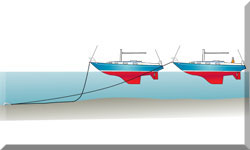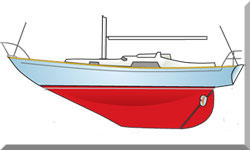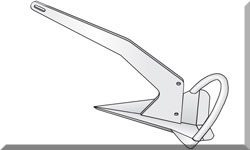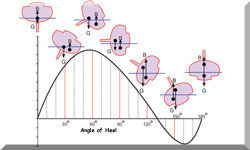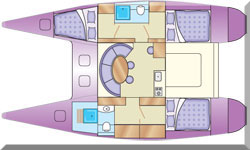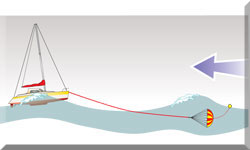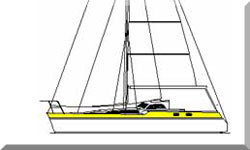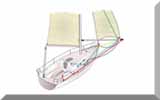- Home
- Cruising Yachts 35' to 40'
- Challenger 35
The Challenger 35 Sailboat
Specs & Key Performance Indicators
The Challenger 35, an ultra-heavy displacement aft-cockpit cruising boat, was designed by Angus Primrose and built in the UK by Trident Marine.
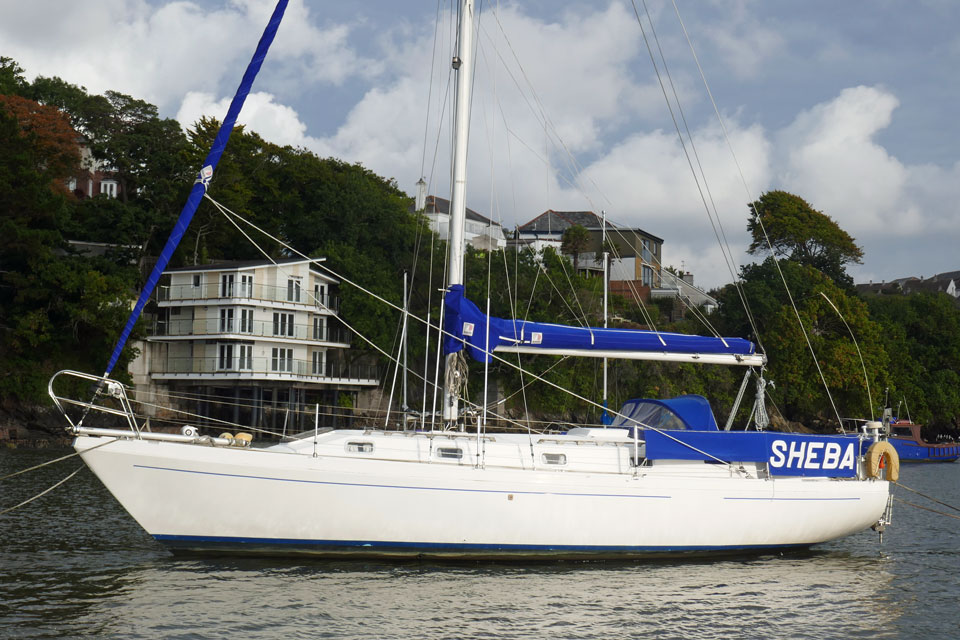 Challenger 35
Challenger 35Published Specification for the Challenger 35
Underwater Profile: Long keel
Hull Material: GRP (Fibreglass)
Length Overall: 35'0" (10.7m)
Waterline Length: 26'1" (8.0m)
Beam: 10'6" (3.2m)
Draft: 5'0" (1.5m)
Rig Type: Masthead sloop
Displacement: 14,950lb (6,781kg)
Ballast: 5,100lb (2,313kg)
Designer: Angus Primrose
Builder: Trident Marine (UK)
Year First Built: 1975
Published Design Ratios for the Challenger 35
1. Sail Area/Displacement Ratio: 11.5
2. Ballast/Displacement Ratio: 34.1
3. Displacement/Length Ratio: 376
4. Comfort Ratio: 35.1
5. Capsize Screening Formula: 1.7
Summary Analysis of the Design Ratios for the Challenger 35
1. A Sail Area/Displacement Ratio of just 11.5 suggests that the Challenger 35 will need a stiff breeze to get her going. In light conditions, unless you've got plenty of time on your hands, motor-sailing may be the way to go.
2. A Ballast/Displacement Ratio of 34.1 means that a long-keel sailboat like the Challenger 35, is likely to benefit from being reefed early to keep her sailing upright in a moderate breeze.
3. A Displacement/Length Ratio of 376, tells us the Challenger 35 is firmly in the ultra-heavy displacement category. Load her up as much as you like and her performance will be hardly affected, not that it was ever startling. Few if any sailboats are built to this displacement category these days - but they remain popular with some long-distance sailors.
4. Ted Brewer's Comfort Ratio of 35.1 suggests that crew comfort of a Challenger 35 in a seaway is similar to what you would associate with the motion of a moderate bluewater cruising boat - a predictable and acceptable motion for most seasoned sailors.
5. The Capsize Screening Formula (CSF) of 1.7 indicates that a Challenger 35 would be a safer choice of sailboat for an ocean passage than one with a CSF of more than 2.0.
Cruisers' Questions about this Sailboat...
What is the difference between the Challenger 35 and the Warrior 35?
What is the difference between the Challenger 35 and the Warrior 35?
The Challenger 35 and the Warrior 35 are two of the three 35-foot designs by Angus Primrose for Trident Marine. They share the same hull moulding, but have different deck mouldings and interiors.
The main difference between them is that the Challenger 35 is an aft-cockpit cruiser, while the Warrior 35 is a centre-cockpit cruiser. This affects the layout and the appearance of the boats.
The Challenger 35 has a spacious and bright interior with a good galley and heads amidships. It has seven berths, but the quarter double is more a large single and the saloon is really only for two people. It has a very traditional angular coachroof and a large cockpit with a tiller steering.
The Warrior 35 has a more compact interior with a smaller galley and heads forward. It has six berths, including an aft cabin with a double berth accessible from the cockpit. It has a very distinctive rounded coachroof and a smaller cockpit with a wheel steering. It also has more headroom and storage space than the Challenger 35.
Both boats have a long keel, a masthead sloop rig, and a modest sail area. They are both heavy displacement cruisers that excel in heavy weather and provide predictable, undemanding, but also unexciting, sailing in less demanding conditions. They are both popular with long-distance sailors who value comfort and safety over speed and performance.
What is the third 35-foot design by Angus Primrose for Trident Marine?
What is the third 35-foot design by Angus Primrose for Trident Marine?
The third 35-foot design by Angus Primrose for Trident Marine is the Voyager 35. It is a pilothouse version of the same hull as the Challenger 35 and the Warrior 35.
The Voyager 35 has a large deck saloon with panoramic windows and a steering station. It has a forward cabin with a V-berth, a quarter berth aft, and two settee berths in the saloon. It has a galley and a heads compartment amidships. It has a masthead sloop rig and a long keel.
The Voyager 35 is a rare and sought-after model that offers good visibility, comfort, and protection from the elements. It is suitable for coastal or offshore cruising.
What does a secondhand Voyager 35 sell for?
What does a secondhand Voyager 35 sell for?
The price range of the Voyager 35 sailboat depends on the condition, age, equipment, and location of the boat. However, based on some online listings, it seems that the average price is between £25,000 to £45,000.
Of course, this is only a rough estimate and the actual price may vary depending on the market demand, the seller's expectations, and the buyer's negotiation skills. It is always advisable to inspect the boat carefully and compare it with similar models before making an offer.
How many people can sleep on board a Voyager 35?
How many people can sleep on board a Voyager 35?
According to the information I found on the web, a Voyager 35 sailboat can sleep up to six people on board. It has a forward cabin with a V-berth, a quarter berth aft, and two settee berths in the saloon.
However, some owners may have modified the interior layout or added extra berths to suit their preferences. Therefore, the actual number of berths may vary depending on the specific boat.
The above answers were drafted by sailboat-cruising.com using GPT-4 (OpenAI’s large-scale language-generation model) as a research assistant to develop source material; to the best of our knowledge, we believe them to be accurate.
Recent Articles
-
Sailboat-Flag Etiquette: Your Questions Answered
Mar 31, 25 02:35 PM
Got a question about sailboat flag etiquette? You'll probably find the answer right here... -
Offshore Passage Making: A Sailor's Essential Guide
Mar 30, 25 03:16 PM
Does the allure of the open ocean call to you? If so, the tips and advice within this Guide to Offshore Passage Making will make essential reading... -
All About Offshore Sailboats and Their Essential Sailing Qualities
Mar 30, 25 02:10 PM
Here’s why some offshore sailboats so much better suited for long-distance offshore sailing than others, and it’s not all a matter of hull construction material and displacement


